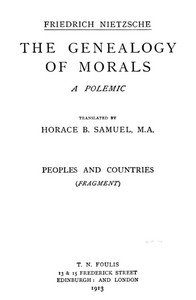The Genealogy of Morals by Friedrich Wilhelm Nietzsche
"The Genealogy of Morals" by Friedrich Wilhelm Nietzsche is a philosophical work published in 1887. Consisting of three interrelated treatises, it traces the evolution of moral concepts to challenge what Nietzsche views as moral prejudices, particularly those of Christianity and Judaism. Through historical analysis, Nietzsche examines how opposing value systems—"good and evil" versus "good and bad"—emerged from different social classes. He explores the aristocratic morality of the powerful and the "slave morality"
born from resentment, revealing how values became inverted throughout history. (This is an automatically generated summary.)
Read or download for free
| Reading Options | Url | Size | |||
|---|---|---|---|---|---|
| Read now! | https://www.gutenberg.org/ebooks/52319.html.images | 382 kB | |||
| EPUB3 (E-readers incl. Send-to-Kindle) | https://www.gutenberg.org/ebooks/52319.epub3.images | 246 kB | |||
| EPUB (older E-readers) | https://www.gutenberg.org/ebooks/52319.epub.images | 247 kB | |||
| EPUB (no images, older E-readers) | https://www.gutenberg.org/ebooks/52319.epub.noimages | 198 kB | |||
| Kindle | https://www.gutenberg.org/ebooks/52319.kf8.images | 353 kB | |||
| older Kindles | https://www.gutenberg.org/ebooks/52319.kindle.images | 316 kB | |||
| Plain Text UTF-8 | https://www.gutenberg.org/ebooks/52319.txt.utf-8 | 350 kB | |||
| Download HTML (zip) | https://www.gutenberg.org/cache/epub/52319/pg52319-h.zip | 220 kB | |||
| There may be more files related to this item. | |||||
Similar Books
About this eBook
| Author | Nietzsche, Friedrich Wilhelm, 1844-1900 |
|---|---|
| Editor | Levy, Oscar, 1867-1946 |
| Translator | Kennedy, J. M. (John McFarland) |
| Translator | Samuel, Horace Barnett, 1883-1950 |
| Uniform Title | Zur Genealogie der Moral. English |
| Title |
The Genealogy of Morals The Complete Works, Volume Thirteen, edited by Dr. Oscar Levy. |
| Note | Also contains: Peoples and Countries (fragment). |
| Note | Wikipedia page about this book: en.wikipedia.org/wiki/On_the_Genealogy_of_Morality |
| Credits | Produced by Marc D'Hooghe (Images generously made available by the Hathi Trust.) |
| Reading Level | Reading ease score: 43.2 (College-level). Difficult to read. |
| Language | English |
| LoC Class | B: Philosophy, Psychology, Religion |
| Subject | Ethics |
| Category | Text |
| EBook-No. | 52319 |
| Release Date | Jun 13, 2016 |
| Most Recently Updated | Oct 23, 2024 |
| Copyright Status | Public domain in the USA. |
| Downloads | 11024 downloads in the last 30 days. |
| Project Gutenberg eBooks are always free! | |

